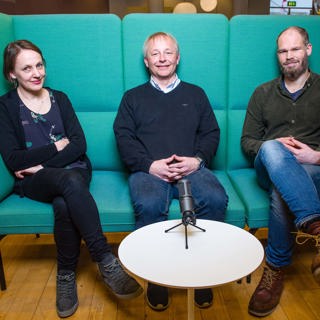
How a Vision Disorder Led to Shocking Brain Science Discoveries | Mark Bear on Neuroplasticity
In this captivating episode, we explore how Mark Bear's personal experience with congenital nystagmus sparked a revolutionary career in neuroscience. Mark shares his remarkable journey from struggling with a visual impairment to making groundbreaking discoveries about how the brain processes visual information, including the identification of a previously unknown neural pathway discovered during his undergraduate years.The conversation delves deep into the fascinating mechanics of human vision, explaining how our brains transform input from two separate eyes into one unified visual experience. Perhaps most intriguingly, Mark reveals critical insights about the brain's developmental windows, particularly how infants must learn to see during their first year of life and why this ability has a strict deadline around age seven. This episode offers a unique blend of personal narrative and cutting-edge neuroscience, illuminating the remarkable plasticity of the human brain and the time-sensitive nature of neural development.02:18 Discovering the Visual Cortex06:58 Understanding Vision and Visual Processing14:47 Exploring Plasticity in the Visual System29:12 The Role of Sleep and Hallucinations in Vision34:07 Memory, Plasticity, and Neuromodulation41:47 Experience-Dependent Plasticity and Learning48:39 Evolutionary Insights from Primate and Cat Visual Systems49:37 Unique Features of Mouse Visual System50:52 Visual Evoked Potentials: Techniques and Discoveries53:19 Stimulus Selective Response Plasticity54:38 Behavioral and Electrophysiological Correlates of Learning01:02:03 Declarative vs. Procedural Memory01:03:54 Hippocampus and Memory Storage01:18:55 Challenges and Future Directions in NeuroscienceFOLLOW US ON SOCIAL:Twitter @ https://x.com/632nmPodcastSubstack: https://632nmpodcast.substack.com/Michael Dubrovsky @ https://x.com/MikeDubrovskyMisha Shalaginov @ https://x.com/MYShalaginovXinghui Yin @ https://x.com/XinghuiYinSUBSCRIBE:Apple Podcasts: https://podcasts.apple.com/us/podcast/632nm/id1751170269Spotify: https://open.spotify.com/show/4aVH9vT5qp5UUUvQ6Uf6ORWEBSITE: https://www.632nm.com
20 Jan 1h 35min

The Current Reality of Quantum Computing | Yudong Cao on Deploying Quantum for Real-Life Problems
In this eye-opening episode, former Zapata Computing CEO Yudong Chen reveals the sobering truth about quantum computing's potential impact on drug discovery and the industry's inflated market expectations. Chen explains why even with perfect quantum chemistry calculations, the business case for quantum computing in pharmaceuticals falls dramatically short of the billions being invested, with a total addressable market of only around $100M.The conversation takes fascinating turns as Chen shares the unusual origin story of Zapata Computing, named after Mexican revolutionary Emiliano Zapata, and traces the company's journey from quantum computing to AI. He provides crucial insights into the field's future, discussing the emerging quantum winter and why government funding, rather than venture capital, may be the path forward. The episode concludes with Chen's compelling vision for advancing quantum computing through focused application development and the need for standardized infrastructure.02:19 The Origin Story of Zapata Computing04:27 Early Challenges and Realizations in Quantum Chemistry06:22 Exploring Optimization and Machine Learning15:46 Understanding Variational Quantum Algorithms29:11 Quantum Computing in Drug Discovery and Industry34:33 Economic Impact and Future of Quantum Computing01:01:35 Classical Chips vs Quantum Devices01:19:40 Reflections on Zapata's IPO and Market Dynamics01:24:12 Future of Quantum Computing and Personal InsightsFOLLOW US ON SOCIAL:Twitter @ https://x.com/632nmPodcastSubstack: https://632nmpodcast.substack.com/Michael Dubrovsky @ https://x.com/MikeDubrovskyMisha Shalaginov @ https://x.com/MYShalaginovXinghui Yin @ https://x.com/XinghuiYinSUBSCRIBE:Apple Podcasts: https://podcasts.apple.com/us/podcast/632nm/id1751170269Spotify: https://open.spotify.com/show/4aVH9vT5qp5UUUvQ6Uf6ORWEBSITE: https://www.632nm.com
13 Jan 1h 52min

From Failed Project to 40 Million Eye Scans: David Huang on the Birth of OCT
Dr. David Huang shares the remarkable journey of how a failed laser surgery project during his MD-PhD studies at MIT led to the invention of Optical Coherence Tomography (OCT), now used in over 40 million eye procedures annually. The story includes a pivotal moment when Professor James Fujimoto volunteered as the first human subject for OCT testing when no other students would agree to have an experimental laser pointed at their eye.The development of OCT was made possible by the 1980s telecommunications boom, which provided crucial fiber optic components. Dr. Huang's unique background combining computer science and medicine proved essential for creating this breakthrough technology. The conversation also explores OCT's rapid commercialization, its impact on treating age-related macular degeneration, and future developments including smartphone-based screening and potential applications for diagnosing brain and heart disease through retinal imaging.Reference Paper on OCT (Science 1991): https://www.science.org/doi/10.1126/science.195716902:31 Understanding Optical Coherence Tomography (OCT)04:09 The Evolution of Eye Imaging Techniques05:34 Technical Principles of OCT10:38 Development and Early Applications of OCT15:23 Challenges and Breakthroughs in OCT25:54 Clinical Acceptance and Advancements in OCT45:32 The Rise of Startups in Academia51:27 Future of Imaging Technologies54:02 Challenges in Developing OCT on a Chip57:27 Rival Optical Imaging Technologies01:05:54 Advice for Young ResearchersFOLLOW US ON SOCIAL:Twitter @ https://x.com/632nmPodcastSubstack: https://632nmpodcast.substack.com/Michael Dubrovsky @ https://x.com/MikeDubrovskyMisha Shalaginov @ https://x.com/MYShalaginovXinghui Yin @ https://x.com/XinghuiYinSUBSCRIBE:Apple Podcasts: https://podcasts.apple.com/us/podcast/632nm/id1751170269Spotify: https://open.spotify.com/show/4aVH9vT5qp5UUUvQ6Uf6ORWEBSITE: https://www.632nm.com
6 Jan 1h 29min

Origins of Life | Anna Wang on Artificial Cells and Nano-Robots
Origins of life researcher Anna Wang takes us on a fascinating journey through the latest theories about how life began, revealing why Darwin's "warm little ponds" are making a comeback and how ocean spray droplets may have served as nature's first test tubes. She explains why early cell membranes were more like soap bubbles - fragile and leaky - and how these imperfections were actually crucial for primitive life to function.The conversation explores the cutting edge of synthetic biology, where scientists are attempting to build artificial cells from scratch. Wang shares illuminating analogies, comparing their work to vegan cooking where researchers must recreate sophisticated biological processes without using modern cellular ingredients. She also discusses the ultimate goal of creating truly evolving systems, while acknowledging both the excitement and concerns surrounding such an achievement. Throughout the discussion, Wang emphasizes how the complexity of biological systems requires collaboration between physics, chemistry, and biology to unlock the mysteries of life's origins.01:58 The Current State of Origin of Life Research04:47 Challenges in Building Life from Scratch12:28 Energy Sources and Membrane Dynamics41:22 Membrane Dynamics and Chemical Gradients48:42 Challenges in Synthetic Biology59:16 Silicon in Biological Systems01:14:37 Reflections and Future AspirationsFOLLOW US ON SOCIAL:Twitter @ https://x.com/632nmPodcastSubstack: https://632nmpodcast.substack.com/Michael Dubrovsky @ https://x.com/MikeDubrovskyMisha Shalaginov @ https://x.com/MYShalaginovXinghui Yin @ https://x.com/XinghuiYinSUBSCRIBE:Apple Podcasts: https://podcasts.apple.com/us/podcast/632nm/id1751170269Spotify: https://open.spotify.com/show/4aVH9vT5qp5UUUvQ6Uf6ORWEBSITE: https://www.632nm.com
30 Des 20241h 15min

Origins of Life | Jack Szostak on Basement Experiments to Nobel Prize-Winning Discoveries
Nobel laureate Jack Szostak takes us on a fascinating journey through his remarkable scientific career, from conducting dangerous chemistry experiments in his basement as a curious child to making groundbreaking discoveries about telomeres that would earn him the Nobel Prize. He reveals how a forgotten DNA sample in his freezer led to fundamental insights about chromosome stability, and explains why studying unusual organisms often leads to the biggest scientific breakthroughs.Beyond his work on telomeres, Szostak shares his current research into life's origins, including revolutionary ideas about how the first cells might have emerged and replicated their genetic material. He discusses his personal approach to choosing research directions, preferring to work in less crowded fields where he can think deeply about problems rather than competing in trendy areas. This philosophy, combined with his willingness to cross disciplinary boundaries, has enabled him to make transformative contributions across multiple fields of science.02:03 Early Career and Interest in Genomics03:32 Hot Topics in Biology and DNA Research05:40 Telomeres and Chromosome Behavior13:48 Telomerase and Its Role in Aging and Cancer18:12 Exploring Life Extension and Aging30:19 Origins of Life and Prebiotic Chemistry43:22 Challenges in Replicating Early Cells47:00 Exploring Protocells and Synthetic Biology54:51 Environmental Conditions for Origin of Life01:06:23 Interdisciplinary Approaches and Future Directions01:25:23 Final Thoughts and ReflectionsFOLLOW US ON SOCIAL:Twitter @ https://x.com/632nmPodcastSubstack: https://632nmpodcast.substack.com/Michael Dubrovsky @ https://x.com/MikeDubrovskyMisha Shalaginov @ https://x.com/MYShalaginovXinghui Yin @ https://x.com/XinghuiYinSUBSCRIBE:Apple Podcasts: https://podcasts.apple.com/us/podcast...Spotify: https://open.spotify.com/show/4aVH9vT...WEBSITE:https://www.632nm.com
16 Des 20241h 26min

The God Particle | Christoph Paus on Higgs Boson, CERN, and CMS
Professor Christoph Paus, a key figure in the discovery of the Higgs Boson at CERN's Large Hadron Collider, discusses his journey in high-energy physics, the challenges of leading large international collaborations, and the future of particle physics. As one of the co-conveners of the CMS Higgs physics group during the historic discovery, Paus provides unique insights into how the detection of this elusive particle was achieved through careful experimental design, data analysis, and team coordination.He explains the Standard Model of particle physics, the significance of the Higgs field and boson, and explores current mysteries like dark matter and antimatter asymmetry. The conversation also covers future collider technologies, from circular and linear accelerators to speculative space-based systems, and the ongoing quest to probe higher energy frontiers.02:24 Understanding the Standard Model08:32 Challenges and Mysteries in Physics11:46 The Higgs Field and Its Implications18:57 Journey into Physics: From Engineering to Higgs22:26 Early Days in High-Energy Physics34:14 Leading Large-Scale Physics Collaborations51:59 Balancing Project Goals and Individual Interests53:07 Community Reviews and Prioritization55:50 The Role of Machine Learning in Physics56:53 Challenges in Discovering the Higgs Boson01:06:07 Future Collider Technologies01:34:51 Exploring Dark Matter and Dark Sectors01:35:33 Current Anomalies in Physics01:40:19 Concluding Thoughts and Future ProspectsFOLLOW US ON SOCIAL:Twitter @ https://x.com/632nmPodcastSubstack: https://632nmpodcast.substack.com/Michael Dubrovsky @ https://x.com/MikeDubrovskyMisha Shalaginov @ https://x.com/MYShalaginovXinghui Yin @ https://x.com/XinghuiYinSUBSCRIBE:Apple Podcasts: https://podcasts.apple.com/us/podcast/632nm/id1751170269Spotify: https://open.spotify.com/show/4aVH9vT5qp5UUUvQ6Uf6ORWEBSITE:https://www.632nm.com
9 Des 20241h 42min

Cold Atoms: Mikhail Lukin on Quantum Optics and Neutral Atom Computing
In this episode, Harvard Professor Mikhail Lukin discusses his pioneering work in quantum computing using neutral atoms. He shares the journey from his early work in quantum optics and electromagnetically induced transparency to developing programmable quantum processors using arrays of individually trapped atoms. Lukin explains key breakthroughs in quantum error correction and how his team achieved unprecedented control over large numbers of quantum bits. He also discusses the fundamental challenges of building practical quantum computers and his optimistic outlook for the field's future.01:16 Early Career and Breakthroughs01:55 Understanding Lasers and Population Inversion03:37 The Birth of Quantum Computing04:21 The Evolution of Laser Technology06:52 The Impact of Bose-Einstein Condensates08:20 First Experiments at Harvard11:51 Challenges in Quantum Computing20:28 Quantum Error Correction28:39 The Role of Rydberg Atoms29:46 Building a Quantum Computer39:34 Overcoming Skepticism and Funding Issues40:46 Technical Innovations in Quantum Computing48:27 Future of Quantum ComputingFOLLOW US ON SOCIAL:Twitter @ https://x.com/632nmPodcastSubstack: https://632nmpodcast.substack.com/Michael Dubrovsky @ https://x.com/MikeDubrovskyMisha Shalaginov @ https://x.com/MYShalaginovXinghui Yin @ https://x.com/XinghuiYinSUBSCRIBE:Apple Podcasts: https://podcasts.apple.com/us/podcast...Spotify: https://open.spotify.com/show/4aVH9vT...WEBSITE:https://www.632nm.com
2 Des 202450min




















